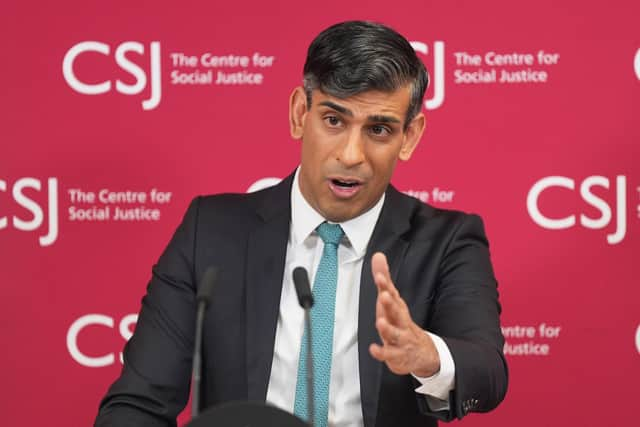We will reform welfare to reduce long-term unemployment numbers - Rishi Sunak
We know there are some with the most severe conditions who will never be able to work and some who can no longer work because of injury or illness.
And they and their loved ones must always have the peace of mind that comes from knowing they will always be supported. But we also have a long-standing and proudly British view that work is a source of dignity, purpose, of hope.
Advertisement
Hide AdAdvertisement
Hide AdThe role of the welfare state should never be merely to provide financial support as important as that will always be but to help people overcome whatever barriers they might face to living an independent, fulfilling life.


Everyone with the potential should be supported and not just to earn, but to contribute and belong. We must never tolerate barriers that hold people back from making their contribution and from sharing in that sense of self-worth that comes from feeling part of being something bigger than ourselves.
That is why this is a moral mission. And why the value of work is so central to my vision for welfare reform.
When we arrived in office in 2010, people coming off benefits and into work could lose £9 for every £10 they earned, by far the highest marginal tax rate. That was morally wrong. So we created Universal Credit to make sure that work always pays.
Advertisement
Hide AdAdvertisement
Hide AdWe introduced the National Living Wage – and increased it every year, ending low pay in this country. We’re rolling out 30 hours of free childcare for every family over nine months of age.. We’ve halved inflation, to make the money you earn worth more and we’ve cut workers’ National Insurance by a third.
For me, it is a fundamental duty of the government to make sure that hard work is always rewarded. I know that you don’t get anything in life without hard work. It’s the only way to build a better life for ourselves and our family; and the only way to build a more prosperous country. But in the period since the pandemic something has gone wrong.
The proportion of people who are economically inactive in Britain is still lower than our international peers and lower today than in any year under the last Labour government. But since the pandemic, 850,000 more people have joined this group due to long-term sickness.
This has wiped out a decade’s worth of progress in which the rate had fallen every single year.
Advertisement
Hide AdAdvertisement
Hide AdWe can’t lose so many people from our workforce whose contributions could help to drive growth.
We can’t afford such a spiralling increase in the welfare bill and the irresponsible burden that would place on this and future generations of taxpayers.
So in the next Parliament, a Conservative government will significantly reform and control welfare.
This is not about making our safety net less generous. Or imposing a blanket freeze on all benefits, as some have suggested.
Advertisement
Hide AdAdvertisement
Hide AdI’m not prepared to balance the books on the backs of the most vulnerable. Instead, the critical questions are about eligibility about who should be entitled to support and what kind of support best matches their needs.
An abridged version of a speech by Prime Minister Rishi Sunak at the Centre for Social Justice.
Comment Guidelines
National World encourages reader discussion on our stories. User feedback, insights and back-and-forth exchanges add a rich layer of context to reporting. Please review our Community Guidelines before commenting.